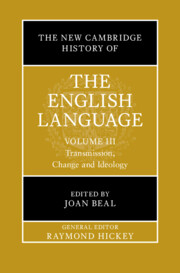Book contents
- The New Cambridge History of the English Language
- The New Cambridge History of the English Language
- The New Cambridge History of the English Language
- Copyright page
- Contents
- Figures
- Tables
- Contributors to Volume III
- General Preface
- Abbreviations
- General Editor’s Introduction
- Introduction to Volume III
- Part I The Transmission of English
- Part II Tracking Change in the History of English
- Part III Ideology, Society and the History of English
- 22 The Ideology of Standard English
- 23 Discourse of Prescriptivism
- 24 English Dictionaries from the Eighteenth Century Onwards
- 25 Networks, Coalitions and Language Change
- 26 Communities of Practice in the History of English
- 27 Indexicality, Enregisterment and the History of English
- Index
- References
24 - English Dictionaries from the Eighteenth Century Onwards
from Part III - Ideology, Society and the History of English
Published online by Cambridge University Press: 23 October 2025
- The New Cambridge History of the English Language
- The New Cambridge History of the English Language
- The New Cambridge History of the English Language
- Copyright page
- Contents
- Figures
- Tables
- Contributors to Volume III
- General Preface
- Abbreviations
- General Editor’s Introduction
- Introduction to Volume III
- Part I The Transmission of English
- Part II Tracking Change in the History of English
- Part III Ideology, Society and the History of English
- 22 The Ideology of Standard English
- 23 Discourse of Prescriptivism
- 24 English Dictionaries from the Eighteenth Century Onwards
- 25 Networks, Coalitions and Language Change
- 26 Communities of Practice in the History of English
- 27 Indexicality, Enregisterment and the History of English
- Index
- References
Summary
Often regarded as comprehensive, impartial and authoritative works, monolingual dictionaries of the standard variety of English have never been neutral repositories of vocabulary. Instead, they have acted as vehicles for ideologies of one sort or another, transmitting societal values as well as linguistic information. All dictionary-makers make decisions on whose and which words to include and to exclude; equally all gather and process these words in ways that influence their presentation to the dictionary-user, employing editorial methods and technological means that have varied from one period to another. This chapter focuses on Johnson’s Dictionary and successive versions of the Oxford English Dictionary in an historically organised account of dictionaries to the present day, noting the under-representation in these two works of women as language-producers. It also discusses editions of the Webster dictionaries, of twentieth-century desk dictionaries before and after the introduction of corpus-based lexicography, and online dictionaries.
Keywords
Information
- Type
- Chapter
- Information
- The New Cambridge History of the English LanguageTransmission, Change and Ideology, pp. 692 - 724Publisher: Cambridge University PressPrint publication year: 2025
References
Primary Sources
Secondary Sources
Accessibility standard: WCAG 2.0 A
Why this information is here
This section outlines the accessibility features of this content - including support for screen readers, full keyboard navigation and high-contrast display options. This may not be relevant for you.Accessibility Information
Content Navigation
Allows you to navigate directly to chapters, sections, or non‐text items through a linked table of contents, reducing the need for extensive scrolling.
Provides an interactive index, letting you go straight to where a term or subject appears in the text without manual searching.
Reading Order & Textual Equivalents
You will encounter all content (including footnotes, captions, etc.) in a clear, sequential flow, making it easier to follow with assistive tools like screen readers.
You get concise descriptions (for images, charts, or media clips), ensuring you do not miss crucial information when visual or audio elements are not accessible.
You get more than just short alt text: you have comprehensive text equivalents, transcripts, captions, or audio descriptions for substantial non‐text content, which is especially helpful for complex visuals or multimedia.
Visual Accessibility
You will still understand key ideas or prompts without relying solely on colour, which is especially helpful if you have colour vision deficiencies.
Structural and Technical Features
You gain clarity from ARIA (Accessible Rich Internet Applications) roles and attributes, as they help assistive technologies interpret how each part of the content functions.
